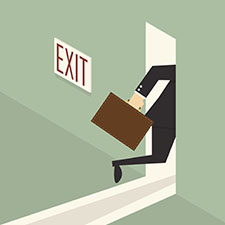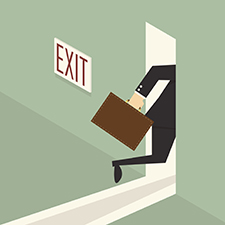 Of course, we all want to find that perfect job that makes us happy, pays the bills, and offers a lifetime’s worth of job security. Unfortunately, those jobs are often hard to find. Author Seth Godin explains that there is a difference between a “dip” and a “cul-de-sac” when it comes to your job. Dips are really difficult periods of time that are full of opportunity to be the best. Cul-de-sacs, on the other hand, are periods where repeated effort and time only lead you back to the same spot.
Of course, we all want to find that perfect job that makes us happy, pays the bills, and offers a lifetime’s worth of job security. Unfortunately, those jobs are often hard to find. Author Seth Godin explains that there is a difference between a “dip” and a “cul-de-sac” when it comes to your job. Dips are really difficult periods of time that are full of opportunity to be the best. Cul-de-sacs, on the other hand, are periods where repeated effort and time only lead you back to the same spot.
If you’re struggling with your current job and it doesn’t seem like anything you try is going to make it better, consider the following tips on recognizing when it’s time to move on and break free from your job.
Assess your on-the-job happiness.
It’s important to find enjoyment out of what you do. Feeling accomplished when you complete a project or knowing that your work is benefiting someone else can help you stay happy on the job. But, if you’re not experiencing those feelings, it may be time to cut ties. If you absolutely dread going to work, so much so that you’re sick or find yourself depressed, do what’s best for you and try to find a job that will make you much happier.
Recognize your worth.
When it comes to proper recognition at work, there are a few ways you may be getting the short end of the stick. If you find out your employer is paying you far less than the market rate for your job, and professional discussions about raises and promotions aren’t resulting in any adjustments to your pay, there’s a good chance your current employer isn’t going to offer you more pay any time soon. If that’s important to you, you may want to shop around for other work.
Determine your supervisor’s level of support.
Likewise, feeling recognized by your supervisor is important to your overall job satisfaction. If you run into challenges at work, does your supervisor support you? Do you feel comfortable telling them about your challenges? According to Dale Austin, director of the Career Development Center at Hope College, “If you’re constantly experiencing problems with your manager, it might be a signal to look elsewhere.”
Evaluate your career path.
Do you have a set path for your career? Is advancement in a company a high priority for your work life? If you have big plans to move up in the company but there is little chance of advancement, it may be time to reconsider your position. Even if you love where you work, you may be missing opportunities to grow your skills if you’re stuck in the same role. “After you’ve learned all you can in your position, it is best to move on to a place that offers a clear path to work your way up,” said Chaz Pitts-Kyser, author of Careeranista: The Woman’s Guide to Success After College.
Go out on a positive note.
If you decide that breaking free from your job is the best step for your career, there are right and wrong ways to quit. Offering your workplace a two-week notice is customary, so try to give your supervisor advance notice that you plan to leave. You may need to train your replacement or tidy up loose ends on projects. Also, make sure you tell your supervisor that you’ve decided to resign before you tell anyone else. You don’t want your boss hearing the news from a gossip chain instead of directly from you. Remember to be thankful for the job and express gratitude to your employer, even if you’re excited to be leaving. You may have gained skills, experience, or friendships that will last far beyond the job, so be grateful for the things that did go well.
Before you decide it’s time to quit, try resolving your issues with your supervisor first. If pay is an issue, talk about your salary openly with your boss. If you feel stressed about your workload or a particular project, co-worker, or other workplace issue, go to your supervisor or the Human Resources department to let them know. If you can’t reach a resolution, or if you find the job just isn’t the right fit for your career path, it may be time to move on.
How did you know it was time to break free from a job? Let us know in the comments section below!
Movin’ On Up is brought to you by Express Employment Professionals.






